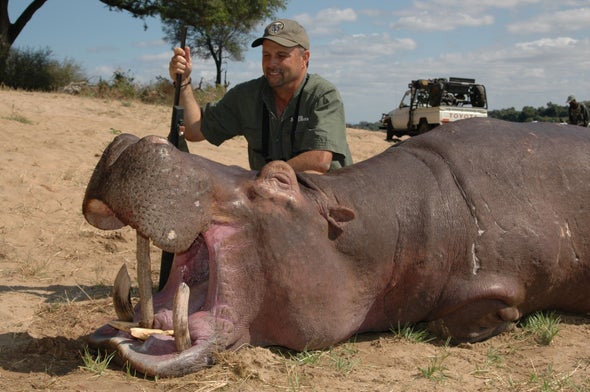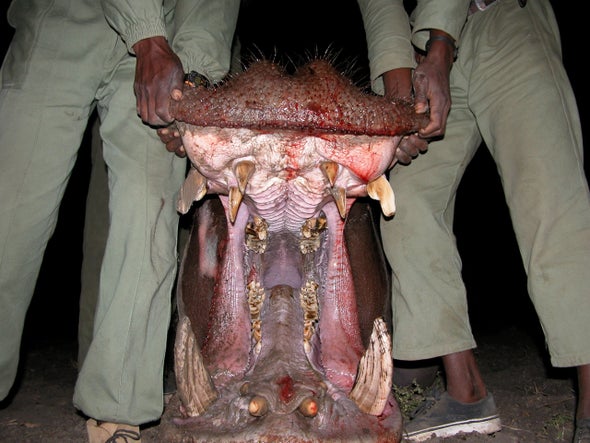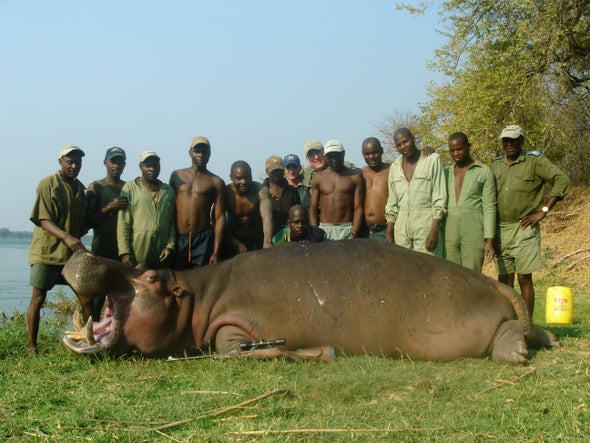AFRICA’S UNDERESTIMATED MONSTERS
The Main Problem Is That Hippos are Always in a Bad Mood
By Dave Fulson • Nov 14, 2025
The hippopotamus is among the most misunderstood of Africa's big game animals. With a fully mature bull weighing up to three tons, I do mean big! To see a pod of sleepy hippos resting dreamily on a river bar or bobbing up and down in the current, you get the impression that they are the definition of laziness and tranquility. Maybe that's a contributing factor to why so many people let their guard down around this mound of potential murder, and learn the hard way that hippos are among the most lethal animals on the planet.

During daylight hours, hippopotamuses spend their time in or very near the water. At night, they come out of the water and will cover incredible distances as they search for enough grass to keep their immense bulk running. Hippos are very destructive feeders, and one or two animals can destroy a native shamba (garden) in a matter of hours. Africans tend to resent this, protecting their crops with guns, bows, spears, thrown torches-anything in an attempt to get the hippos moving. Unfortunately, many get them moving in the wrong direction, and cause yet another fatality in a long, long list of those who crossed a hippo in the wrong mood and paid the price with their lives. In fact, the main problem is that hippos are always in the wrong mood.
In the water, a big cow may think a canoe is a threat to her calf and trundle over to smash it to pieces. The screaming, thrashing inhabitants suddenly floundering on the surface will also be perceived as a renewed attack, so she will continue lunging and biting until all is nice and quiet. She won't eat you, or what's left of you, but maybe that's why the crocs and hippos hang out together! If you think cows are impressive, you just must see a big bull in action. If you are in a watercraft (and there have been recorded cases of hippo attacking paddle wheel steamships, for God's sake), and a bull thinks you are muscling your way into his territory after his group of cows, you are in for a show. Hippos are very agile on land, but they are downright greased lightning in the water, and God help you if you find yourself at one's mercy, because as statistics show, they have very little. The open-mouthed yawn is a warning, not a prelude to a nap. A bull will usually, not always, display his big, self-whetting ivory tusks, thick as baseball bats, in an attempt to intimidate a rival, whether it's you or another bull. If he's pressed or just in the right mood, he will come at you, pushing a wave of water in front of him, until he blows through the surface into your face. Only a brain shot through his open mouth will save you at this point. My advice is not to push him around unless you're ready to handle the consequences.
Most land encounters with hippos happen at night, but certainly not all. Some hippos, especially huge, old outcast bulls, often make homes for themselves in small pools of water far away from the nearest permanent water. Countless times have I seen hippos up close, and by airplane as much as ten miles from the nearest lake or river, semi-submerged in small, isolated waterholes deep in the bush. Trust me on this. Beware of these bulls! They are, without a doubt, the most likely of any unwounded big game in Africa to charge the hunter, should you push it. I have done so twice, and the results have been dramatic on both occasions. One bull of immense proportions came at our video crew on a hunt in Tanzania and had to be iced by a well-known PH at eight feet after a headshot by the client, fired at 15 feet, failed to stop or even slow down the charge.

Hippo have a total of 12 teeth, but it is the big canines that are the working weapons of atrophy bull. As big bulls constantly fight for possession of cows, a mature male will carry a lifetime, of scars, punctures and cuts on his colossal frame. These scars help the hunter to determine sex when the animal is out of the water or standing on a sandbar. If submerged, a bull can also be picked out by the more pronounced humps in his upper lip caused by his lower incisors jutting upward. Once a trophy has been selected, you will need to move in for the shot, and in hippo hunting, there are two options: land or water.
A hippo found during daylight hours on land is usually very close to water or on the move back to his aquatic security blanket. Want to experience an honest "Honey, he was going to eat me" charge while on safari? Easy, just cut a land-bound bull off from the most direct line of retreat to water. Works every time! At this point, a brain or spinal column shot is the only way to prevent your demise from the raging bulk bearing down on you with the speed of a gifted high school halfback. I've been there... I know. If you catch him on land unaware, a big slug through the shoulder or brain will drop him on the spot. A heart-lung shot will also bring him down after a short sprint, but I'd anchor him with the shoulder shot if you ask for my advice. In the water, you will have to brain him or risk losing the trophy. You will usually have plenty of time to set up and get steady as your PH picks the bull out of the constantly bobbing heads of your boy's herd. This is not always an easy job. Once this is accomplished (and you should be on a solid rest such as a sandbag by now), you must push a big bullet through the orange-sized brain, the location of which your PH will be whispering in your ear. If you accomplish this, the bull will simply vanish with little ceremony beneath the surface. Muck it up, however, and you will see an animal version of a depth charge detonation up close and personal. He may stay on the surface, raging in his pain and anger, while he looks for the cause.

You and your professional hunter better both get busy with backup shots wherever you can hit him, because the time for pinpoint accuracy has long passed. Fail, and you will pay the trophy fee and leave a potential killer loose on the river for the next guy who comes along. Take your time and do it right for everyone's sake! If you brained the hippo, the gases in his stomach will float the carcass usually between one and three hours. Once located, a boat team will secure the carcass and tow it to a location where it can be winched on shore by the PH's vehicle.
Hippos are great eating, and they also make fine lion and croc bait, as well as producing fine leather. And of course, there are the ivory tusks. A final thought on the hippopotamus: Some say they are big, and they undeniably kill lots of people, but a truly dangerous game animal? Come on! The African Professional Hunter's Association, one of the hunting world's most experienced and qualified group of experts, consider them dangerous and made it official in January 2003 at their annual meeting. By their standards, the "Big Five" is now the "Dangerous Seven" with the addition of our friend the hippopotamus onto that most hallowed of big game lists. A hunt for this aquatic bad boy is a vastly different experience from any other hunt Africa can dish up for the visiting sportsman. Moving up behind a big elephant or facing down your first lion is certainly more classic Africana, but you're making a mistake if you hunt Africa and pass up the opportunity to hunt this challenging aquatic heavyweight.
STORIES, STRATEGY & SAFARI WISDOM
Go beyond the screen with Dave Fulson’s most insightful writings from over the years.
Each article brings you closer to the skills, stories, and mindset of true African hunting.